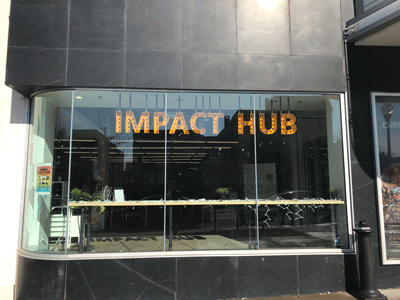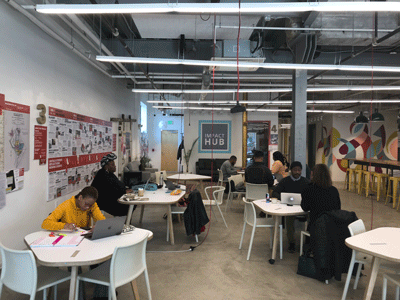The Impact Hub, a shared office and event space designed for social entrepreneurs, recently celebrated three years of operation at its Station North location in Baltimore. The venue hosts a wide variety of events, including: skill-share workshops, market space for local vendors, and lectures by members of the surrounding community, in addition to providing co-working space for small businesses.
“We’re more than just space. This space is really just a container for all of the incredible people and resources that are here,” executive director Michelle Geiss told the Baltimore Times.
A variety of freelancers, small business owners and entrepreneurs call the Impact Hub home. For a monthly membership fee, these individuals can access the venue’s facilities, connect with other startups and find assistance and support to help their businesses grow.
Kieta Iriarte-Amin, the business consultant behind Mpolo Business Solutions credits the Impact Hub with helping her business to flourish.
“Membership at IHB continues to be one of the best businesses decisions I have made,” she told The Baltimore Times. “When I joined IHB, my professional circle was very small and I did not trust the opinions or suggestions from others. IHB helped me perfect the vision and the mission of my business while getting feedback from others in my same place professionally.”
In addition to professional networking opportunities, the Impact Hub provides forums in which local small business owners can engage with the public they serve. Almost all of IHB’s events are free and open to the public.
“When I talk to people who come into the space, members or not, a lot of them see this as a public meeting space,” said Michelle Antoinette Nelson, the IHB’s director of community engagement. “I think people see Impact Hub as a community-based platform that they are welcome to.”
Diversity is a core component of the Impact Hub’s nonprofit model. In 2018, 59 percent of its members were women and 46 percent identified as black. Major areas addressed by its members’ startups
included education, economic opportunity, health and the arts. In 2018, 45 percent of members worked in the nonprofit sector, mirroring the setup of the IHB overall.
“We’re one of the few [Impact Hubs] in North America that’s a nonprofit model,” said Geiss. “We wanted to be able to make sure this space was accessible and working towards economic opportunity and racial equity— we changed our whole co-working model in 2017 to reflect those values.”
A basic IHB membership fee for freelancers and other individuals costs $50 per month, while $150 per month gives members access to business support and an experience more tailored for entrepreneurs. These “Grow” memberships can also be earned through the IHB’s work trade program.
Iriarte-Amin considers the work trade program to be ideal for her needs as an entrepreneur.
“As a small business owner, the access to the space and the openness of the community made me want to invest more of my time. I then became a member of the work/trade program,” she said. “This was a perfect partnership. Giving tours of a place I love, greeting guests, all in exchange for a membership I would have gladly paid for.”
In total, there are over 100 Impact Hubs in cities around the world, including twelve in the United States. Their success has largely been dependent on their roots within their local communities. For
instance, the New York City Impact Hub recently shut its doors. However, Geiss notes that it faced difficulties due to being run from outside of the city.
“What’s different about us is we started in Baltimore, grew up organically here, and started with the community building piece of it,” she said. “It’s important to be investing in the entrepreneurs and the small businesses of Baltimore. Our city is full of people who have an idea of what could be better, and what neighborhoods could look like, and how we can re-imagine the city for people that are long-term residents.”
“We need to be spreading out the investment in people really far and wide so it gets into neighborhoods that need reinvestment,” she added. “A lot of the folks that are working on that in really transformative ways are working out of this space.”
Natalie Wallington

